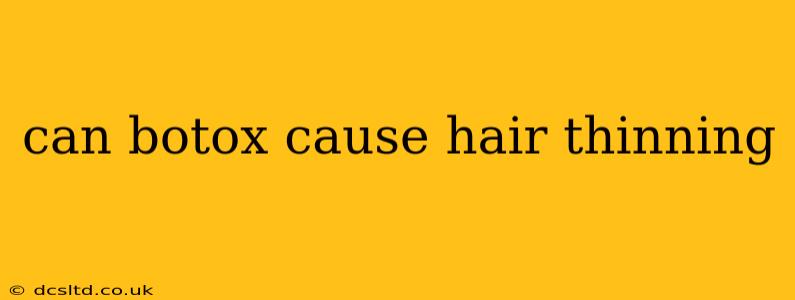Can Botox Cause Hair Thinning? Separating Fact from Fiction
Botox, a popular cosmetic treatment used to reduce wrinkles, has become increasingly common. However, a question frequently arises: can Botox cause hair thinning? The short answer is: it's unlikely, but there are some nuances to consider. Let's delve into the details to separate fact from fiction.
What is Botox and How Does it Work?
Botox, or botulinum toxin type A, is a neurotoxin that temporarily paralyzes muscles. When injected into the face, it blocks nerve signals responsible for muscle contractions, resulting in a smoother, less wrinkled appearance. This effect is temporary, typically lasting several months before the effects wear off. The treatment targets facial muscles, not the scalp or hair follicles.
Can Botox Directly Cause Hair Thinning?
Directly causing hair thinning is not a known side effect of Botox injections. The toxin doesn't affect hair follicles, which are responsible for hair growth. The injection sites are also typically far removed from the scalp.
What About Indirect Effects?
While Botox itself doesn't attack hair follicles, some indirect factors might contribute to concerns about hair loss:
-
Stress: Any medical procedure, even a minor one, can induce stress. Chronic stress is a known trigger for hair loss (telogen effluvium), where hair follicles enter a resting phase prematurely, leading to shedding. This is a temporary condition, and hair growth usually resumes once the stress subsides.
-
Underlying Medical Conditions: If you're experiencing hair thinning, it's crucial to rule out underlying medical conditions. Hair loss can be a symptom of various health problems, including thyroid issues, hormonal imbalances, nutritional deficiencies, or autoimmune diseases. Botox doesn't cause these conditions, but their existence might coincide with Botox treatments, creating a false association.
-
Improper Injection Techniques: Although rare, improper injection techniques could potentially damage the scalp's blood supply, impacting hair follicle health. This risk is minimal when administered by a qualified and experienced medical professional.
Can Botox injections near the scalp cause hair thinning?
While unlikely, Botox injections in very close proximity to the scalp could theoretically affect hair follicles if the toxin inadvertently diffuses into the area. However, reputable practitioners avoid this by carefully selecting injection sites and using appropriate techniques. It’s important to discuss this concern with your practitioner.
What if I'm experiencing hair thinning after a Botox treatment?
If you notice hair thinning after receiving Botox, it's essential to consult your doctor or dermatologist. They can assess your condition, investigate potential underlying causes, and recommend appropriate treatment options if necessary. It's crucial to rule out other contributing factors before attributing hair loss solely to the Botox treatment.
How can I minimize the risk of hair thinning?
Choosing a qualified and experienced practitioner is paramount. A skilled professional will understand the anatomy of the face and will inject the Botox precisely and safely, minimizing any potential risks. Additionally, maintaining a healthy lifestyle, including a balanced diet and stress management techniques, can promote overall health and hair growth.
In conclusion, while there's no direct evidence linking Botox injections to hair thinning, indirect factors and coincidental circumstances can create the illusion of a connection. Consult a medical professional if you have concerns about hair loss, regardless of whether you've had Botox treatments. Remember, proper medical advice is crucial for accurate diagnosis and personalized treatment.
